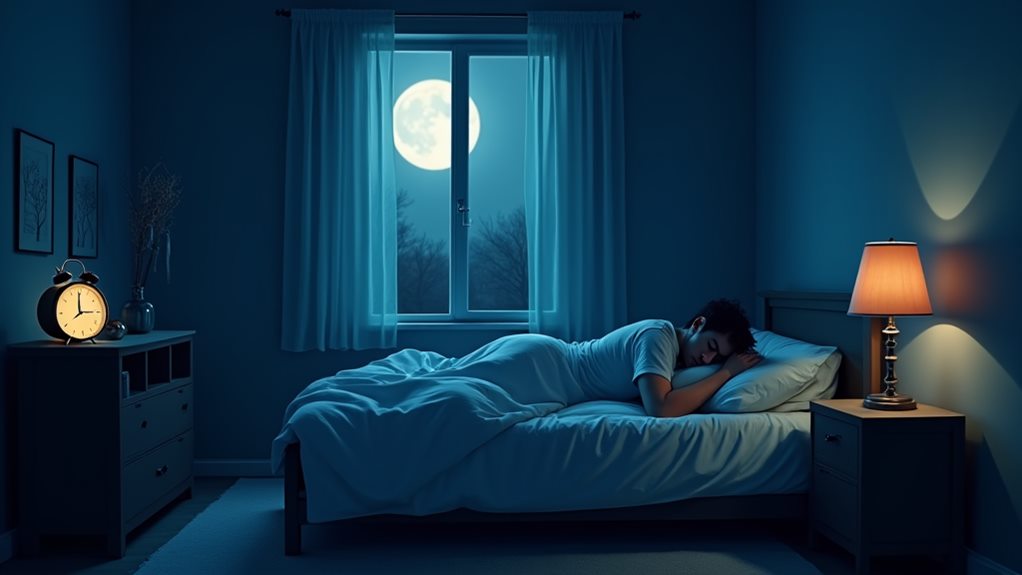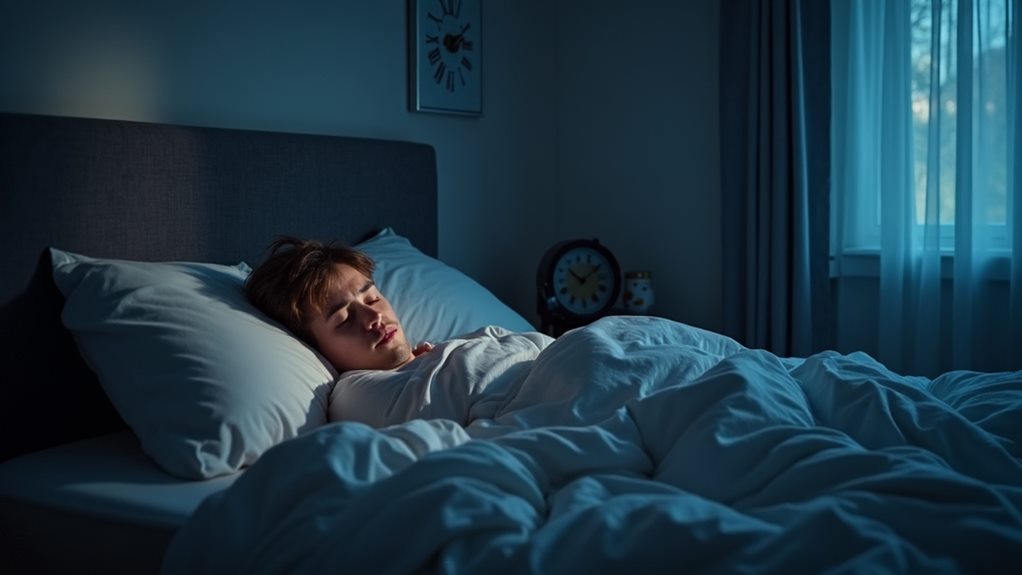
Prioritizing healthy sleep is crucial for your overall wellness because it supports your physical health by regulating hormones, boosting your immune system, and assisting with muscle recovery. It also reinforces mental well-being by enhancing focus, decision-making, and emotional resilience. Consistent sleep can lower your risk of chronic diseases like heart disease and diabetes, while poor sleep can lead to anxiety and depression. By ensuring quality sleep, using a cool and quiet environment, and maintaining a regular sleep schedule, you enhance both your daily productivity and long-term health. Discover how sleep can transform your life in more profound ways.
The Role of Sleep in Health
Getting enough quality sleep is not just a luxury; it’s a crucial pillar of maintaining good health. You might not realize it, but the importance of sleep stretches far beyond just feeling rested. Quality sleep is a powerhouse for your physical and mental health, impacting how you think, feel, and function daily. While a healthy diet is essential, sleep works in tandem, helping regulate hormones and allowing your body to repair and renew overnight. Without it, you’re more susceptible to ailments like heart disease, diabetes, and obesity, not to mention a weakened immune system that leaves you vulnerable to illnesses. Additionally, sleep plays a significant role in optimizing muscle recovery and enhancing performance in physical activities by aiding muscle repair and protein synthesis.
The benefits of sleep extend throughout your entire being. When you prioritize sleep, you enhance memory consolidation, clear toxins from your brain, and recover efficiently from physical activities. Simply put, sleep is your body’s natural reset. To improve sleep quality, establish a consistent routine and create a sleep-friendly environment. Ensuring you get those essential 7-9 hours per night can elevate your energy levels, sharpen your focus, and boost overall well-being. So, next time you’re tempted to skimp on shut-eye, remember: prioritizing sleep is investing in your health.
Sleep’s Impact on Mental Wellbeing
While sleep is foundational for physical health, its influence on mental wellbeing is equally profound. Did you know that a lack of sleep is linked to increased symptoms of depression and anxiety? It affects nearly 30% of adults who report difficulty sleeping. The harmony between mental and physical health hinges significantly on your quality of sleep. Regular exercise, too, can promote better sleep patterns and improve mood, making it a great complement to healthy sleep habits. When you’re sleep-deprived, cognitive functions like decision-making and focus take a hit, further impacting your mental wellbeing.
Additionally, social jet lag, affecting almost half of adults, can throw off your mood and sleep patterns, disrupting your mental health. If you struggle with fatigue and irritability from insufficient sleep, it’s your brain’s way of showing how crucial sleep is for emotional wellbeing and regulation. These feelings can snowball, making emotional challenges tougher to handle.
However, engaging in good sleep hygiene can transform this scenario. By improving sleep quality through better habits, you boost emotional regulation and build resilience against mental health issues. So, if you want to enhance both mental and physical health, prioritizing sleep isn’t just a good idea—it’s essential for maintaining emotional balance and mental clarity. Don’t underestimate the power of a good night’s sleep.
Common Sleep Disorders

When it comes to sleep, disorders like insomnia, obstructive sleep apnea, and restless legs syndrome often interfere with that elusive rest we all crave. Prioritizing quality sleep can be a powerful stress reliever, significantly improving mood and mental clarity. Insomnia affects about 30% of adults, leaving you tossing and turning through the night. It can make waking hours challenging, impacting daily tasks and mental health. If you’re finding it hard to fall or stay asleep, insomnia might be the culprit.
Obstructive sleep apnea is another common sleep wrecker, causing disruptions in breathing and leaving you feeling exhausted. It’s not just the snoring but the risks associated with it—like cardiovascular diseases and constant daytime sleepiness. If you’re suffering from this, it’s not just about a bad night’s sleep but long-term health risks.
Then there’s restless legs syndrome, that annoying urge to move due to discomfort in your legs. It doesn’t just disturb your sleep but your overall well-being, making it difficult to relax and recharge. Together, these sleep disorders impact over 50 million Americans, leading to cognitive impairments, reduced concentration, and worsening mental health issues like anxiety and depression. Addressing these conditions is crucial for improving sleep quality and enhancing overall wellness.
Recommended Sleep Durations
Having covered the challenges posed by common sleep disorders, it’s vital to focus on how much sleep you actually need. For most adults, the recommended sleep durations fall between seven to nine hours each night. This range is essential for maintaining your health and well-being. Consistently getting insufficient sleep can negatively impact you, leading to cognitive impairments and increasing the risk of chronic conditions. So, it’s not just the quality of sleep that matters but also ensuring you meet your individual sleep needs.
Not everyone requires the same amount of sleep. Newborns need 14-17 hours of sleep daily, while babies should get 12-16 hours, including naps. Toddlers benefit from 11-14 hours, which considers their nap times too. As children grow, school-aged ones need 9-12 hours, while teenagers should aim for 8-10 hours to support their growth and development. These varying needs highlight why it’s crucial to tailor your sleep durations to your age and lifestyle.
Understanding and prioritizing these recommended durations will help you achieve optimal health. So, pay attention to how much sleep your body and mind need to function at their best every day.
Effects of Sleep Deprivation

Sleep deprivation isn’t just about feeling tired; its effects can be quite serious. It opens the door to various health problems, significantly raising your risk for chronic conditions like heart disease, diabetes, and obesity. But it’s not just about physical health—your mental faculties take a hit too. Have you noticed difficulty making decisions or trouble focusing? Sleep loss impairs cognitive function, leading to reduced productivity and a drop in the overall quality of life.
Approximately 30% of adults report issues with sleep, and over 25% experience daytime sleepiness. Such widespread sleep difficulties aren’t surprising, considering the pressures of daily life. But it’s crucial to acknowledge that insufficient sleep can actually worsen mental health issues. Studies link sleep disturbances to heightened symptoms of anxiety and depression, which can be detrimental.
Worse still, accumulating sleep debt—over 10% of adults miss out on two or more hours weekly—leads to chronic exhaustion and further health deterioration. So, if you’ve been skimping on shut-eye, it’s time to take action. Aiming for better sleep starts with recognizing these risks. Improving sleep should be a priority for your overall wellness. Don’t underestimate its importance!
Enhancing Sleep Quality
Creating the ideal environment is crucial for enhancing your sleep quality. A cool, dark, and quiet room helps you relax and reduces disturbances that might interrupt your restful sleep. But there’s more to it than just your surroundings. Regulating your sleep schedule—going to bed and waking up at the same time every day—keeps your body’s internal clock steady, allowing for continuous, undisturbed rest.
Adopting certain habits can make a difference in your sleep patterns. Here are a few effective tips:
- Daily Exercise: Committing to at least 20 minutes of exercise each day can help you fall asleep faster and improve sleep quality.
- Screen-Free Hour: Steer clear of screens and electronic devices at least an hour before bedtime to reduce blue light exposure and promote melatonin production.
- Caffeine and Alcohol Limits: Cutting back on caffeine and alcohol, especially close to bedtime, prevents disruptions that impact sleep quality.
- Consistent Sleep Schedule: Stick to consistent bedtimes and wake-up times to keep your sleep schedule aligned.
Keeping these strategies in mind ensures you enjoy more restorative sleep. After all, making small changes can significantly impact your overall well-being. Incorporate these techniques to enhance your sleep quality and wake up refreshed every day.
Tips for Better Sleep

When it comes to achieving better sleep, paying attention to a few key strategies can make all the difference. Establishing healthy sleep habits is crucial for both a good night’s sleep and your physical health. One essential tip for better sleep is to avoid screens at least an hour before bedtime. Blue light emitted by screens can mess with melatonin production, making it tough to wind down.
Exercise is another powerful tool. Just 20 minutes of daily activity can help you fall asleep faster and improve sleep quality. Don’t forget about meal timing; it’s wise to keep meals consistent and avoid heavy eating a few hours before bed to regulate your body’s internal clock.
Getting some bright light exposure during the day, especially in the morning, can boost your circadian rhythms, setting you up for sound sleep at night. All these steps can mitigate the impacts of a lack of sleep, leading to better overall wellness. By adopting these tips for better sleep, you’re setting yourself up for lasting physical health and more revitalizing rest each night. Give these strategies a try, and enjoy more restful nights.
Healthy Sleep Environment
Crafting a healthy sleep environment can significantly enhance the quality of your rest, transforming your nights into rejuvenating experiences. Start by focusing on creating a sleep-friendly environment tailored just for you. Maintaining an optimal sleeping environment, where the room is cool, dark, and quiet, sets the stage for more restful nights. Aim for temperatures in the low to mid-60s Fahrenheit – it’s amazing how much comfort influences the depth of your sleep.
Here’s how to up your sleep game even more:
- Limit blue light: Cut back on electronics at least an hour before bed to improve the ease of falling asleep.
- Regulate with a consistent sleep schedule: Going to bed and waking up at the same time every day helps your internal clock stay on point.
- Engage in a relaxing pre-sleep routine: Activities like reading or mindfulness can gently gear your body down, signaling it’s time for sleep.
- Minimize distractions: Use blackout curtains and white noise machines to keep unwanted light and sound at bay.
These tweaks can help you transition smoothly into slumber and wake up refreshed. Prioritizing these changes can make all the difference between a restless night and a restorative one.
Sleep and Physical Health

Ever wonder how sleep affects more than just your energy levels? It’s not just about feeling refreshed; sleep plays a crucial role in maintaining your physical health. In fact, a good night’s sleep helps regulate your hormones and metabolism, key factors in managing weight and reducing obesity-related risks. Navigating through sleep stages each night strengthens your immune system, lowering the risk of infections. On the flip side, not getting the right amount of sleep can be a disaster for your health.
Studies have shown that sleep deprivation increases the likelihood of developing heart disease and diabetes. These are serious conditions that underscore the importance of sleep in protecting your cardiovascular health. When you don’t sleep enough, your body craves unhealthy foods, especially carbohydrates, leading to poor dietary choices that can further harm your health. Moreover, lack of sleep can sap your motivation to be physically active, negatively impacting your overall fitness and health goals.
Sleep Needs by Age
Understanding the intricate dance of sleep needs is crucial as we navigate through different life stages. Each age group’s unique sleep requirements play a significant role in their physical and cognitive development. As a parent or caregiver, it’s essential to be aware of these needs to ensure that you and your loved ones are getting enough sleep for optimal health.
Consider these general guidelines to help tailor your family’s bedtime routine:
- Newborns: They require the most sleep, clocking in 14-17 hours daily to support their rapid growth.
- Babies: Look for about 12-16 hours, including naps, which are vital for their physical development and cognitive growth.
- Toddlers: Ensure they receive 11-14 hours, combining night sleep and naps, which are crucial for maintaining their energy levels and mood.
- Preschoolers and School-aged Children: Aim for 10-13 and 9-12 hours each night, respectively, as this supports learning, social skills, and overall wellbeing.
Teenagers aren’t left out; they need 8-10 hours for academic performance and health. Establishing a consistent bedtime routine based on these sleep needs by age can significantly benefit everyone in your household, ensuring that both body and mind rejuvenate effectively.
Public Health Strategies

In today’s fast-paced world, public health strategies must prioritize sleep as a cornerstone of overall well-being. With nearly 30% of adults struggling to get quality sleep, it’s clear that addressing this issue can boost productivity and improve health. You might not realize it, but sleep problems like insomnia affect mental health and daily functioning. It’s crucial that public health campaigns highlight the importance of sleep quality and promote effective insomnia management.
Integrating sleep disorder recognition into healthcare programs can make a significant difference. For instance, including sleep assessments in initiatives like Improving Access to Psychological Therapies can support individuals facing mental health challenges exacerbated by poor sleep. Additionally, enhancing GP training with a focus on sleep can help address the prevalence of sleep disorders, which impact over 50 million Americans today.
There’s more: the economic burden linked to sleep-related health issues is immense—running into billions. Promoting better sleep hygiene and raising awareness are vital public health measures. Non-pharmacological insomnia management guidelines by NICE offer effective strategies without medication risks. By emphasizing sleep’s role in health, you can make a real difference in reducing these societal costs and improving community health outcomes.
Research and Developments
While scientists continue to explore the complex nature of sleep, groundbreaking research offers valuable insights into improving sleep health. It’s clear that insufficient sleep affects far more than just your energy levels. A significant portion of the population experiences sleep-related issues that have broad implications on both mental and physical health.
Consider these key findings from recent studies:
- Nearly 30% of adults report difficulties with falling or staying asleep, underscoring a widespread sleep health issue.
- Over 25% of adults experience daytime sleepiness, as revealed by the National Sleep Foundation’s 2022 Sleep In America Poll, impacting your productivity and overall health.
- More than 30% of adults accumulate at least 1 hour of sleep debt weekly, a startling indication of insufficient sleep and inadequate rest.
- The CDC highlights that insufficient sleep is a public health problem, elevating risks for chronic conditions like heart disease and diabetes.
Sleep deprivation doesn’t just disrupt your routines; it can also exacerbate mental health issues such as anxiety and depression. Recognizing these connections is vital. Prioritizing sufficient sleep will ultimately enhance your well-being, productivity, and longevity by reducing risks associated with chronic physical health conditions.
Sleep Enhances Mental Resilience

Sleep serves as a cornerstone for mental resilience and overall well-being. Throughout this article, we’ve explored how adequate sleep directly affects the brain’s ability to function optimally, manage emotions, and maintain stable moods. Consistently achieving 7-9 hours of quality sleep can enhance emotional regulation and stress management, crucial elements for maintaining mental health. Furthermore, the absence of sufficient sleep detracts from cognitive abilities, leaving individuals vulnerable to poor decision-making, emotional instability, and impaired social interactions, thereby increasing the risk of burnout and strained relationships.
Prioritizing sleep is more than mere indulgence; it is essential for nurturing mental resilience. With nearly 30% of adults facing challenges with sleep, it becomes imperative to adopt strategies and lifestyle choices that promote quality rest. This approach not only safeguards mental health but also enhances one’s capacity to empathize, solve problems, and navigate life’s demands efficiently. By recognizing the intrinsic link between sleep and emotional well-being, individuals can make informed choices that support a balanced, healthy, and more resilient life. The path to mental resilience begins with the conscious decision to prioritize and value the transformative power of sleep.














